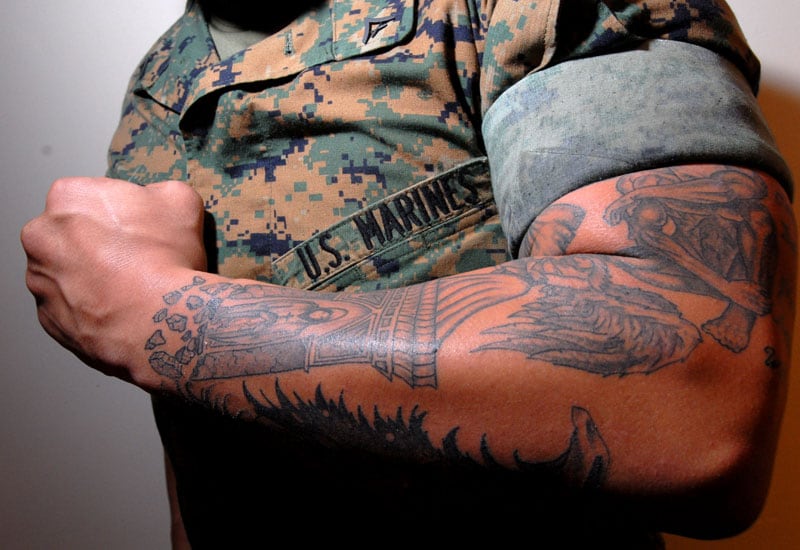Tattoo sleeves are back for Marines in 2022.
Sleeve tattoos were first banned in 2007 after the 2006 Sergeants Major Symposium found Marines of the times to have “excessive” tattoos.
In 2016 the tattoo policy was relaxed slightly, but sleeves were still banned and tattoos visible in physical training uniforms blocked Marines from serving on special duty assignments that come with extra pay and improved promotion ability.
Though the 2016 policy allowed an unlimited number of tattoos for enlisted Marines, as long as they were not sleeves, officers and officer candidates were limited to just four visible tattoos in their PT uniform.
The new policy does away with any rank distinction brining all Marines under the same policy.
RELATED

In terms of size of placement Marines are only prohibited from tattoos on their face, head, neck and hands, with the exception of one ring-like tattoo.
Removing the ban on knee or elbow tattoos heralds the return of sleeves for Marines.
Chest and back tattoos must remain below the collarbone and seventh cervical vertebrae and must be fully covered by a “a properly fitting crewneck T-shirt with no portion of the tattoo showing,” according to the new policy.
Despite the change, Marines looking to join the Marine security guard program may want to think before getting tatted.
“Sleeve tattoos will not automatically disqualify Marines from being assigned to the Marine Corps Embassy Security Group (MCESG),” Capt. Ryan Bruce, a Marine Corps spokesman, told Marine Corps Times on Dec. 16. “However, the MCESG will continue to screen current and contemplated tattoos for all applicants and Marines currently serving as Marine Security Guards.”
“This screening process will determine if a Marine’s tattoos are suitable for worldwide deployment, to include regions that may have cultural sensitivities to different types of tattoos. MCESG will continue to restrict service for those with tattoos that host nation or interagency partners may find offensive or inconsistent with our diplomatic mission,” Bruce added.
Though the Marine Corps did away with most limitations on the placement and size of tattoos, the new policy comes with increased scrutiny on the content of the tattoo.
Both the 2016 policy and the current policy ban tattoos that are “are drug-related, gang-related, extremist, obscene or indecent, sexist, or racist.”
The previous policy defined extremism philosophies as, “those which advocate racial, gender, or ethnic hatred or intolerance; advocate, create, or engage in illegal discrimination based on race, color, gender, ethnicity, religion, or national origin; or advocate violence or other unlawful means of depriving individual rights under the U.S. Constitution and federal or state law.”
The most recent update expands that definition to include, discrimination based on sexual orientation or gender identity.
The policy also explicitly bans tattoos that, “advocate, engage in, or support terrorism; advocate, engage in, or support the forceful, violent, unconstitutional, or otherwise unlawful overthrow of the government of the United States, any state, commonwealth, district, or territory of the United States; or advocates, engages in, or encourages military personnel or DoD or US Coast Guard civilian employees to violate laws or disobey lawful orders or regulation for the purpose of disrupting military activities.”
This is an excerpt from “19 Things Marines Need To Know For 2022,” in the January print edition of Marine Corps Times.




